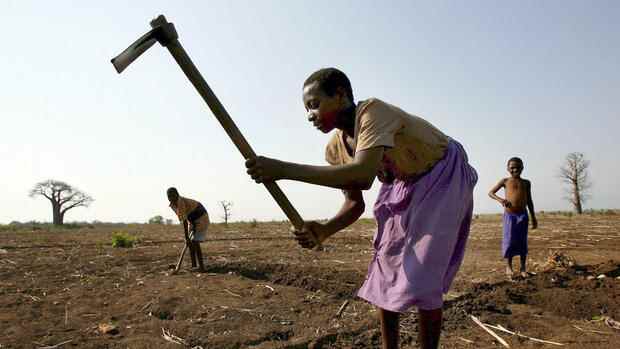The consequences of climate change are hurting agriculture on the continent.
(Photo: dpa)
New York, Dusseldorf The UN General Assembly is facing major discussions. The poor countries of the world are hoping for more help from the industrialized countries, whose budgets have been weakened by the Ukraine war and the pandemic. The Microsoft founder and philanthropist Bill Gates asked the Handelsblatt that the rich countries, because of their responsibility for the climate crisis, primarily help agriculture in Africa, which is particularly suffering from drought and a lack of grain deliveries.
“The rich world created this gigantic problem that is already hurting Africa’s agricultural productivity with higher temperatures today,” Gates said. Africa could double its harvest if the global community invests enough in new seeds that are resistant to drought, for example.
UN Secretary-General Antonio Guterres also called for more help from the global North. “Damage and losses caused by the climate crisis are not things of the future. They’re happening now, all around us,” he said recently in Pakistan, where floods have killed more than a thousand people. The industrialized countries would have to step in and help the poorer countries.
According to the UN, rising food prices have pushed 71 million people into poverty. World Food Program chief David Beasley said the world must act now to save people from starvation in the drought-stricken Horn of Africa.
Top jobs of the day
Find the best jobs now and
be notified by email.
According to a McKinsey study published in August, the global food supply situation is now worse than it was when the Arab Spring broke out around 12 years ago. By the end of 2023, up to 60 million tons of grain could be missing from the global food supply. This corresponds to the food supply for up to 250 million people in one year.
Many poorer countries are struggling with the consequences of the climate crisis.
(Photo: dpa)
Ukraine alone is exporting several million tons less grain this year – and the ship transports that started a few weeks ago for the first time since the outbreak of war in February were not able to ease the situation as hoped. For the coming year, the McKinsey Report expects grain production in the Ukraine to remain 35 to 45 percent below previous years.
Open Society President calls for 2 percent of GDP for solidarity funds
Mark Malloch-Brown, president of philanthropist and investor George Soros’ Open Society Foundations, sees the danger. that developed-country governments are too focused on their domestic energy and food-price problems. He warned the Handelsblatt that the important global joint effort to combat hunger, climate change and inequality could be omitted.
Malloch-Brown is looking at important meetings this fall: the UN General Assembly in September, the World Bank meeting in October and the G20 summit and the UN climate summit in November. He warns of serious political unrest in developing countries because of rising and rising food and energy prices.
At the last UN climate conference, possible compensation for developing countries for the climate damage they caused was a controversial topic. In the Climate Vulnerable Forum, 48 developing countries from Asia, Africa, the Caribbean and Latin America have joined forces and vote for such payments. They represent around 1.2 billion people.
More Handelsblatt articles on the food crisis
Malloch-Brown sees the need for a global solidarity fund of 2 percent of global gross domestic product. “With this we could get the green transformation back on track and fight climate change, inequality and health problems,” he said.
In a global survey of more than 20,000 people in 22 countries worldwide commissioned by the Open Society Foundations, 58 percent of respondents in Germany and France and 53 percent of Americans spoke in favor of using two percent of the national budget for such a solidarity fund.
A global insurance fund against climate damage also found a majority among respondents in France and Germany. In the US, exactly half of the survey participants were in favor of it. Overall, respondents would also welcome stricter regulation of food prices worldwide.
The Bill & Melinda Gates Foundation’s annual “Goalkeepers Report” criticizes that the Ukraine war and the pandemic have set the global community far back. The report measures the extent to which the Sustainable Development Goals set by the global community in 2015 have been met. The goals range from poverty reduction and gender equality to food security, health and education. According to the report, in order to still achieve the goals by 2030, the world would have to work five times as fast on the individual aspects.
More: Fertilizer shortages, pesticide bans – farmers and agribusiness fear for the harvests
